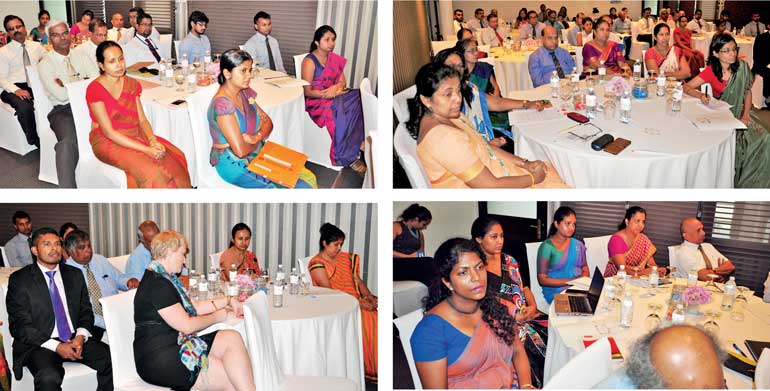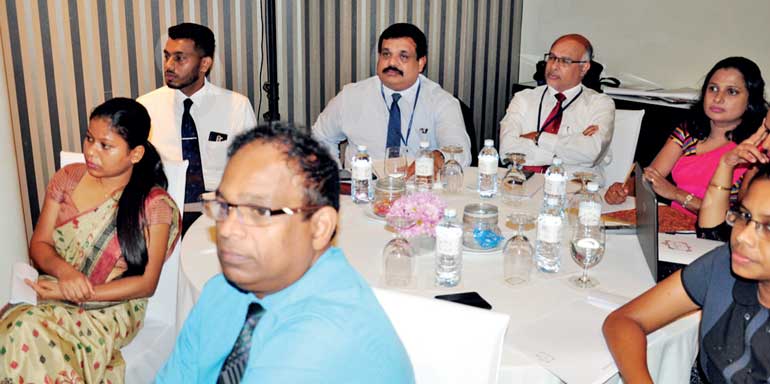Wednesday Feb 25, 2026
Wednesday Feb 25, 2026
Thursday, 12 October 2017 00:38 - - {{hitsCtrl.values.hits}}



By Hiruni Dabarera
Implementation of the National Trade Facilitation Agreement (NTFA) with the World Trade Organisation will be a big boost to the competitiveness of Small and Medium Enterprises (SMEs) to face local and global challenges and opportunities.
To better harness this potential a two-day multi-stakeholder workshop kicked off yesterday in Colombo to prioritise the key areas in the business reform process and to provide the platform for coordination among various sectors and agencies.
The initiative was held by the National Trade Facilitation Committee (NTFC) in collaboration with the International Trade Centre (ITC) and the World Bank.
The workshop will help prioritise the reforms required to implement the World Trade Organisation’s Trade Facilitation Agreement (TFA). It will also focus on coordinating implementation of the TFA.
Operationalising the TFA will have a positive impact on the private sector. SMEs are likely to benefit the most as the TFA will ease access to international markets and increase ease of cross border trade. Economic growth and more job opportunities are expected as a direct result of the increase in international trade.
This workshop follows a mandate by the NTFC Secretariat to develop a detailed action plan for the implementation of Sri Lanka’s Category B & C commitments under the TFA. Technical assistance is provided by the ITC and the World Bank.
Technical assistance for this project by ITC is carried out under ‘EU-Sri Lanka trade-related assistance: Increasing SMEs trade competitiveness in regional and EU markets’, a project funded by the European Union and implemented by the International Trade Centre.
Inaugurating the workshop, EU Ambassador to Sri Lanka and the Maldives, Tung-Lai Margue, said: “SME’s represent 90% of global enterprises and provide over 70% of private sector employment.”
In Sri Lanka it is 65%. Yet, they find it difficult to engage in transactions across borders. Margue believes the agreement will assist SMEs to participate in the global value chain and increase international trade revenue.
Margue further revealed how the GSP Plus, if effectively implemented, will benefit the country more than the general duty access to the EU. To comply with the rules to be eligible for this trade benefit, the majority of raw materials and other inputs need to be of domestic origin. This provides new companies with the opportunity to become suppliers to existing manufacturers or for them to engage in what he terms ‘backward integration’. Foreign investors will also be attracted by this.
This agreement is a result of the TFA, which was a significant outcome of WTO’s ninth conference held in Bali, Indonesia in December 2013. Following its implementation by the Government in February, a NTF Committee was set up with a Secretariat. These efforts were commended by the EU and World Bank representatives.
In keeping up with the Government’s vision on policy framework titled ‘Sri Lanka Vision 20125 - a country enriched’, several provisions have been made to improve Sri Lanka’s position as a global logistics hub (mainly provisions of physical infrastructure and development of the port, airport and highway network).
World Bank representative Amila Dahanayake stated how the country also needs to enhance the productivity of its logistics sector by embracing recent technological advancements.
However, the Department of Commerce asserted how reforms pertaining to technology advancements were additional commitments and they did not encourage it as it would lead to an increase in legal commitments. The TFA focuses on transparent, simple and consistent import and export procedures at present and they believe that it will suffice for the moment.
Speaking to Daily FT, Department of Commerce Director Gothami Silva stated: “We expect the agreement to focus more on the exporters than the importers for ultimately it is export revenue which will cater to development.”
The two-day workshop will cater to the implementation process of the agreement. Prior to this, seminars and workshops were held to educate participants on the obligations arising from the agreement, benefits from it and the responsibilities of the implementing agencies. The action plan which was developed collectively will be subjected to discussion during the workshop and successfully completed with the feedback received by implementing agencies.
“The length of the reform process depends on the Government. Sri Lanka can extend or shorten it as they desire,” said ITC Trade Facilitation Adviser Pierre Bonthonneau.
He revealed how one of the key objectives of the workshop was to try and link what can be done during a limited timeframe, for some reforms need financial backing, political will and absorption capacity. The workshop will decide on what reforms should be implemented first depending on how important they are to the private sector and through this decide on the timeframe that the Government is willing to comply with.
Pix by Sameera Wijesinghe